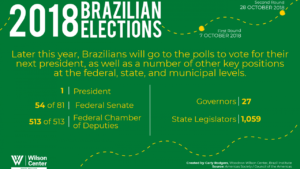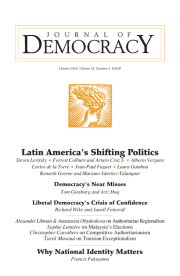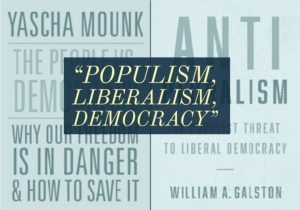
Wilson Center
Brazil’s election, along with the rest of the populist trend, represents something more disruptive than a single wave with a single point of origin. Research suggests it exemplifies weaknesses and tensions inherent to liberal democracy itself — and that, in times of stress, can pull it apart, analyst Max Fisher writes for The New York Times:
When that happens, voters tend to reject that system in all but name and follow their most basic human instincts toward older styles of government: majoritarian, strong-fisted, us-versus-them rule. It’s a pattern that might feel shocking or new in the West, but is all too familiar in Latin America, which has experienced several populist surges like the one that elevated [Jair] Bolsonaro.
 “Most attempts at democracy end in a return to authoritarian rule,” Jay Ulfelder, a political scientist, wrote in 2012 as elected populists in Venezuela [aka Maduro’s Mafia State], Ecuador and Nicaragua rolled back rights in ways that look familiar today. At the time, most experts blamed issues specific to that region and that moment. But Mr. Ulfelder countered, “I think we get a lot farther if we think of these regimes as the end state toward which most attempts at democracy will slide.”
“Most attempts at democracy end in a return to authoritarian rule,” Jay Ulfelder, a political scientist, wrote in 2012 as elected populists in Venezuela [aka Maduro’s Mafia State], Ecuador and Nicaragua rolled back rights in ways that look familiar today. At the time, most experts blamed issues specific to that region and that moment. But Mr. Ulfelder countered, “I think we get a lot farther if we think of these regimes as the end state toward which most attempts at democracy will slide.”
Brazil’s new president is a throwback to its authoritarian past—but the country’s democratic institutions are more resilient than they used to be, Bard College professor Omar G. Encarnación writes for Foreign Policy.
“Latin America’s Shifting Politics” is a focus of the latest issue of the National Endowment for Democracy’s Journal of Democracy, including:
- Steven Levitsky with an assessment of democracy’s overall fortunes in the region;
- Forrest D. Colburn and Arturo Cruz S. on Costa Rica;
- Laura Gamboao on Colombia;
- Carlos de la Torreo on Ecuador; and
- Jean-Paul Faguet on Bolivia.

Insecurity may enhance the appeal of authoritarian rule, Fisher adds:
When people believe they are at risk of targeted violence, their sense of community narrows, according to research by Daphna Canetti-Nisim, a University of Maryland political psychologist. They grow more supportive of policies to control minorities and less supportive of pluralism or democracy. Those impulses can be exploited….A three-country study led by Marta Marchlewska of the Polish Academy of Sciences found that the trouble often starts when members of a particular social group believe their group is declining in status relative to others.
What’s next for Argentina? IRI asks Dr. Benjamin Gedan, Senior Adviser of Latin America Programs and Director of the Argentina Project at the Wilson Center; open government and transparency expert, and General Manager of Directorio Legislativo, Agustina De Luca; and Ambassador Lino Gutierrez, U.S. Ambassador to Argentina from 2003 to 2006.







